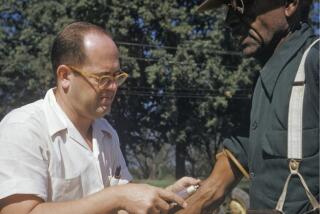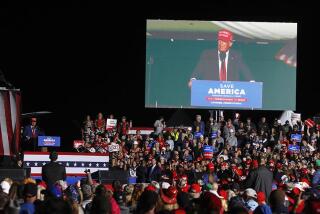Wearying Realities of Race Again Hit Home
- Share via
You have to understand the subtext, said Helen Goss, a black law student at Whittier College of Law. You have to understand how much it hurts when society makes you take sides, makes you choose.
Yes, she said, O.J. Simpson probably killed his ex-wife. But when a mostly black jury acquitted the black sports hero of murder, she was trapped on her side of the racial divide.
It happened again this week, when she watched television shots of “public gloating” among white people outside the Santa Monica courthouse after a mostly white civil jury ruled that Simpson was responsible for the deaths of his wife and her friend.
The pictures of the courthouse celebrations “felt like a public lynching,” Goss said. And suddenly her belief that Simpson was guilty came in second; the racial line had been drawn again. After all, wasn’t racism--a group injury--more serious than individual questions of right and wrong?
This emotional tug-of-war leaves Goss weary, frustrated by America’s obsession with discussing the Simpson case in the crudest of racial generalities.
Indeed, many who find themselves tired of the Simpson case attribute that weariness to the cumulative effect of having so many complex emotions boiled down through the prism of race.
For whites, the fatigue often stems from seeing the case portrayed as an issue of racial injustice. For blacks, it is more likely to come from the feeling that white America has been judging not merely Simpson, but also other blacks, such as the lawyers who made his case and the largely African American jury that acquitted him of murder.
“One of the things that may be going on here is the notion, the very strong notion of racial kinship,” said Randall Kennedy, an African American Harvard University law professor who is writing a book on the criminal justice system. “It’s the way in which people so often feel compelled to put people into racial groups and to draw racial boundaries around things, even things that are not inherently about race.”
The wearying tension of being judged for your race--of whites presuming you support Simpson simply by the color of your skin--was brought home to Helen Goss on Tuesday evening, when the civil verdict was announced.
She was in a law school class waiting for the teacher to arrive, surrounded by mostly white classmates. Most of the students were glued to the television set.
Anticipating the outcome, Goss was uncomfortable. She didn’t want to be there when the cheers went up. She didn’t want to be emotionally drawn into the drama of the verdict. She was relieved when her professor walked in, turned off the television and began the lecture.
“If you are a black person in a majority-white room when this decision comes down, all eyes are on you. I went home and said, ‘I don’t know what I feel. I just want to move forward.’ ”
Whites, meanwhile, say they are just as bewildered by the way the homicide case turned into a racial contest.
In a shopping center in the largely white, upper-class Ventura County community of Oak Park on Tuesday, Wayne Stitzer called the first verdict a “travesty.” But he could only greet the second with numbness.
“I’ve been surprised--and disgusted--at how many people focused on the racial [aspects],” Stitzer said. “You know, ‘They got theirs, and now we’ve got ours.’ ”
Kennedy ran into this confusion when he wrote a commentary for the Boston Globe after Simpson was acquitted of criminal charges. Kennedy, who believed Simpson was guilty of murder, tried to explain the deeper notion of black celebration that broke out in some quarters after the acquittal.
“I got these letters afterward from some white people who wrote me and said, essentially, ‘I view you as an apologist for these people, this is crazy and I’m never giving to the NAACP again.’
“It’s at that point that I would imagine some [white] people feeling, ‘This person [Kennedy] has put me into a bind. He’s being racist and I’ve got to challenge him, even though on the question of O.J.’s guilt, we agree . . . and it’s now a racial issue.’
“I think people should sort of fight against being put in racial boxes and being made to be representative of groups or doing anything other than trying to understand things the best they can,” Kennedy said.
Both Kennedy and Goss shared the same dilemma: For African Americans, the trial had much deeper implications than for whites, said Cheryl Harris, a visiting professor in UCLA’s law school, where she teaches courses in constitutional law and civil rights.
“What is at issue here is not just the guilt or innocence of this man,” Harris said. “That . . . is almost subsumed within this larger debate about the possibilities of fairness within a criminal justice system that passes out so many different ‘justices’ by race and class and sometimes, gender.”
But when blacks celebrated Simpson’s acquittal as a symbolic victory over past injustices, whites tended to see it as a defiant thumbing of the nose. And when whites celebrated Tuesday’s civil verdict against Simpson as a simple evening of the score, many blacks viewed it as whites unnecessarily flexing their muscles to put a black man in his place.
Many African Americans became disillusioned with the justice system because they felt the former superstar was being victimized by “double jeopardy,” said Earl Ofari Hutchinson, author of “Beyond O.J.: Race, Sex and Class Lessons for America.”
“There was an unfairness there in making O.J. go through this again. Many African Americans felt [the civil trial verdict] was a done deal,” he said.
A Gallup Poll taken Wednesday night found little shifting along the racial line: 71% of whites say that the murder charges against Simpson were probably or definitely true. Only 28% percent of blacks feel that way, up only slightly from 24% in the first post-Bronco chase poll conducted in July 1994. A majority of blacks also say that they feel at least somewhat sympathetic to Simpson, compared to only about a third of whites.
Says Harvard professor Kennedy: “There seems to have been an underemphasis of the fact that there is a significant number of black people who say they do believe he’s guilty. People continue talk as if that 25% didn’t exist. It’s too bad, and an oversimplification of a much more complicated reality.”
Frank Holoman, a onetime state assemblyman and now restaurateur in the Crenshaw district, believes that many African-Americans, like himself, are not particularly sympathetic to O.J. and are perhaps even alienated from him as a figure who had spent little time in their midst since gaining his fame.
“Most people think O.J. is guilty,” added Holoman, “but they look at the thousands of white people who have killed blacks historically and people did nothing about it. Now they see one person who got away. They see that as some sort of vindication, a symbol for them. People look at it like, ‘Take that, there is one for you.’ ”
White outrage in the wake of the first verdict--particularly comments targeted at the intelligence of black jurors--did little to narrow the gap.
“The criminal trial was totally racist because the jurors were all black,” said Linda Glasgow, a white West Los Angeles teacher. “They were all behind O.J., they didn’t even listen to the facts. All they thought about was that this was their big football hero.”
This time, she said, justice was served by “a better quality of jurors that looked more carefully and understood the evidence.”
UCLA professor Harris said that such characterizations contributed to some blacks’ feeling that they were boxed in. Such comments “led a number of [black] people to feel compelled to defend the jury, if not to defend O.J.,” she said.
To many whites, race has become a tired issue, no longer relevant in an era when a significant number of blacks enjoy multimillion-dollar incomes with lavish lifestyles. Why, they ask, was the trial of a rich celebrity so continually bathed in racial implications, from courtroom strategy to public opinion polls?
“You may be tired of it but it won’t go away,” answers Andrew Hacker, a white professor of political science at Queens College and author of “Two Nations: Black and White, Separate, Hostile, Unequal.”
“It’s deeper and more enduring,” said Hacker. Whites say, “I’ve done nothing wrong. I’m in favor of civil rights, I love Martin Luther King Jr., I love Colin Powell. I’m not the enemy so why do you keep talking about race?” he said. But “to say ‘Hey, let’s act as if it doesn’t exist’ is just farcical, it is like acting as if the law of gravity doesn’t exist.”
For Anise Aschenbach, one of two whites on the panel that found Simpson not guilty in the criminal trial, weariness stems from the widespread perception that race was the jury’s determining factor. Not true, she said; it was the larger community that increasingly saw the case as part of a race debate.
“I don’t think it really played a big part in either trial, but that is how it was seen” by the public, she said.
The weariness that plagues people like Helen Goss comes from the realization that heartfelt discussions between people of different races are few and far between, or limited to cliches like the Simpson trial.
“It’s one of those dirty little family secrets that we don’t want to talk about,” she said.


